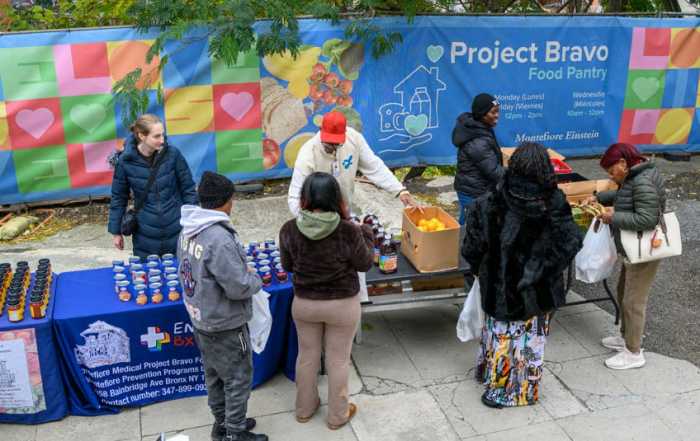What’s the most consequential question in New York’s June 23 Democratic congressional primaries?
Whether the Bronx’s District 15 — one of the most heavily Democratic but also poorest House districts in the nation — chooses the Reverend Ruben Diaz, Sr., a city councilmember who has been stridently outspoken against LGBTQ rights and a woman’s right to choose for more than a quarter century.
With perilous uncertainty about the presidential contest in November and a tough calculus for Democrats to regain control of the Senate, it is vital that New York deliver as progressive a House delegation to support Speaker Nancy Pelosi in the 2021 Congress.
Diaz deserves no place in that delegation.
But the danger on June 23 is that Diaz has remarkable name recognition in the Bronx — as, alternately, a councilmember and a state senator, as a Pentecostal minister who on numerous occasions has rallied his followers to mass political gatherings on issues like opposition to marriage equality, and as the father of the borough president who shares his name, Ruben Diaz, Jr.
The other big problem is that there is a big field of contenders in the race, many of whom proclaim themselves — with varying degrees of truthfulness — as progressives. Among numerous candidates, there are two other members of the Council, a former Council speaker, a state assemblymember, and a Democratic socialist who has the support of the neighboring district’s congressmember, Alexandria Ocasio-Cortez.
It is altogether possible for the vast majority of District 15 voters to cast a ballot for one of the progressive choices yet have Diaz slip by as victor based on a very narrow plurality.
Voters must coalesce around one of Diaz’s opponents.
Our wholehearted recommendation is that voters choose Councilmember Ritchie Torres.
Torres’ story is a remarkable one. The child of a single mother in Bronx public housing who struggled week in and out to put food on the table, by his early 20s, as a staff member for then-Councilmember Jimmy Vacca, Torres was responsible for housing issues — which usually meant he worked as a tenant organizer in poor neighborhoods where many folks were NYCHA residents like he was.
In 2013 at age 25, when he ran his first successful Council race — which made him the Bronx’s first out gay elected official — Torres, in an interview with Gay City News, exhibited uncanny thoughtfulness, poise, and gut connection to the issues facing his community.
“As a young man of color, I can say that there is a crisis of young men in our society,” he said at the time.
When asked a question, his answers were not programmed, he would take a moment to formulate his thoughts, and then he offered striking insights communicated in precisely articulated fashion.
Torres hit the ground running when he took office in 2014, and though he was elected at the same time as Mayor Bill de Blasio, who was hailed as a progressive champion — a sheen that has by now worn very thin — Torres never shied away from taking on City Hall.
The housing work he did in Vacca’s office served him well during the four years he chaired the Public Housing Committee. Torres pressed the NYCHA chair on the public housing agency’s lamentable record in lead paint testing; misrepresentations made by that official in response to his questioning led her to resign several months later.
When de Blasio entered into a consent decree with the Trump administration giving the feds extraordinary control over NYCHA, Torres, by then chair of the Oversight and Investigations Committee, challenged the mayor himself, asking why he surrendered before the facts of Washington’s investigation into the agency were made public.
Last week, Torres joined with Council Speaker Corey Johnson in demanding that investigation of NYPD conduct during the recent protests be handled free from interference by de Blasio’s Corporation Counsel Office.
Charging that the mayor is “tone-deaf,” Torres wrote, “Calling it an ‘independent investigation’ does not make it so… Corporation Counsel, a Mayoral official, has a conflict of interest that disqualifies it from investigating the NYPD. It would represent the NYPD in litigation. We cannot afford a sham investigation that has neither the appearance nor the substance of independence.”
Beyond his evident willingness to push hard against City Hall, Torres has consistently worked to improve the quality of life for queer residents of the Bronx and citywide, particularly in the provision of mental health services. He has in the past been frank about his own struggles with mental health challenges as a young man attending NYU.
Beyond these qualifications, Torres, more than any other candidate, has proven his commitment to ensuring that Diaz not represent the Bronx in Washington — being the first to signal interest in the race. In that respect, one of his opponents, former Council Speaker Melissa Mark-Viverto — who won that post in good measure thanks to the boost de Blasio, as mayor-elect, gave her bid in 2013 — entered the race late, and could fairly be characterized as a spoiler. The competition between her and Torres has become heated, but she has failed to offer a compelling rationale for her candidacy — which comes on the rebound from her failed bid for public advocate last year — when a contender as talented and determined as Torres had already taken the gloves off against Diaz.
Another Democrat who joined the race after failing to capture the public advocate job last year is Assemblymember Michael Blake, who worked in the Obama administration and the former president’s election campaigns after political jobs in Michigan and Illinois. His election to the Assembly in 2014 was plagued by charges that he wasn’t actually a Bronx resident, and he has apparently decided he’d like a return ticket to DC.
Yet another public advocate hopeful from last year, Manhattan Councilmember Ydanis Rodriguez, disqualifies himself from consideration by progressives due to his longstanding ties to both Diaz and Bronx Councilmember Fernando Cabrera, who turned up in Uganda in 2014 right after that nation enacted a harsh anti-gay law and made a YouTube video, later taken down, praising its leaders.
The one other candidate who has attracted attention in the race is Samelys López, a community organizer who has the support not only of Ocasio-Cortez, but also the Working Families Party. Despite that support, she recently polled at only two percent — compared to the two clear frontrunners: Diaz at 22 percent and Torres at 20 percent.
It’s significant that in a progressive challenge to 16th Congressional District Representative Eliot Engel, Working Families engineered the withdrawal of one of Engel’s two opponents to unify the vote against him. Why has the WFP put such a premium on defeating Engel, while sitting back and giving Diaz a stronger chance to win in NY15?
One last point to make about this race. Diaz recently sent out one of his “What You Should Know” dispatches in which he touts my praise of him for showing support for Abel Cedeno, the 19-year-old bullied gay youth sent to prison for 14 years for the fatal stabbing of another high school student during a classroom rumble. I stand by that praise — and fully acknowledge that one issue on which Diaz has shown leadership is concern for the rights of those accused in the criminal justice system. I wish Torres and others in the race had acted as Diaz did.
Life and politics would be much simpler if our allies always did everything we wished they would — and opponents always proved themselves unworthy. In 2003, Barney Frank, a harsh critic of the war in Iraq, explained to me his support for pro-war John Kerry’s presidential campaign by saying, “If I thought I could find a candidate who agreed with me on everything, I’d run for president myself.”
The winner in the 15th Congressional District will face untold numbers of issues in office next year. The candidate we believe will most closely align himself with the values and goals we hold dear is Ritchie Torres.
And we know only too well that the election of Ruben Diaz, Sr., would be a tragic step backwards for the cause of equality and inclusion in American society.
To sign up for the Gay City News email newsletter, visit gaycitynews.com/newsletter.

















